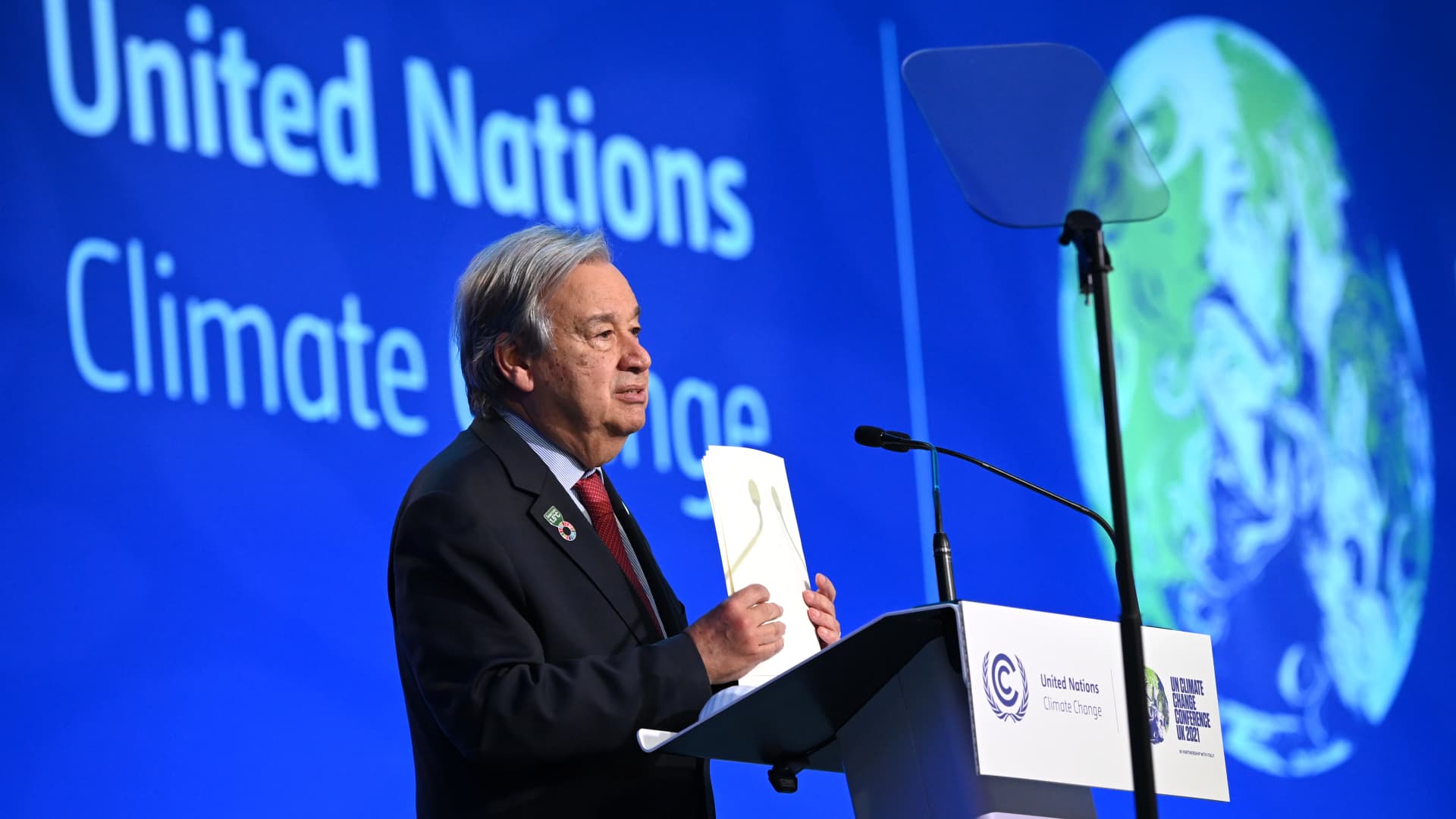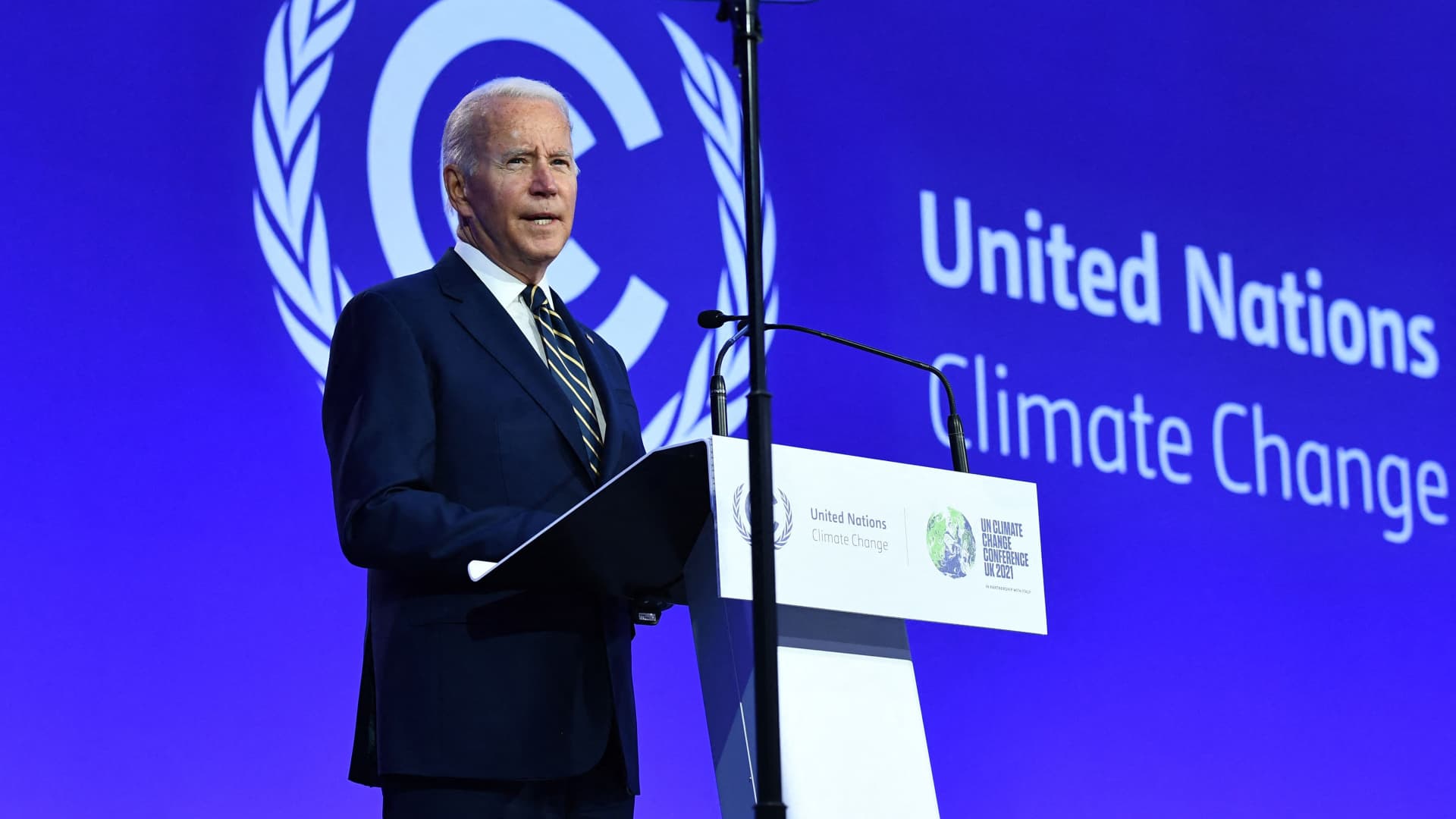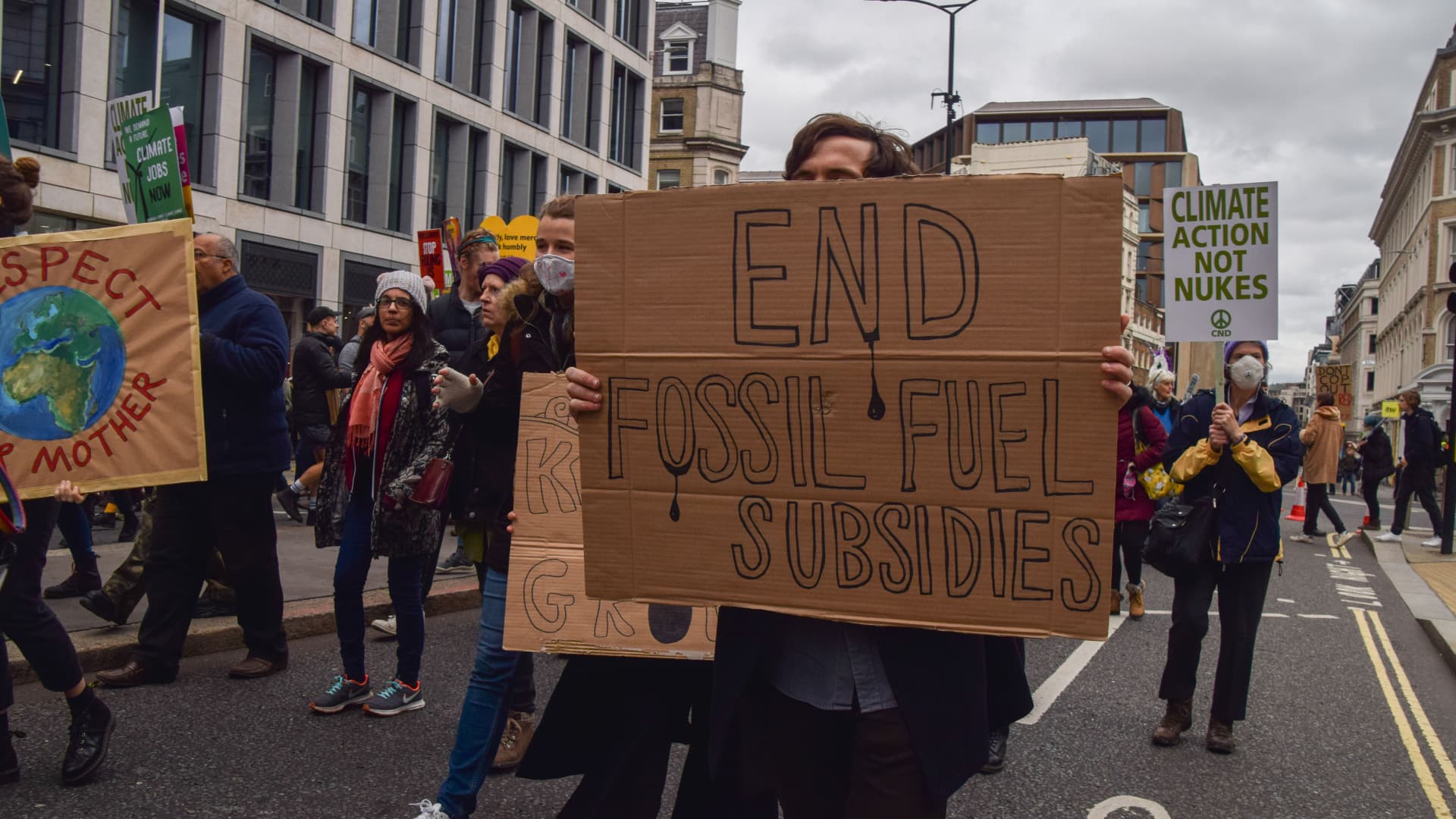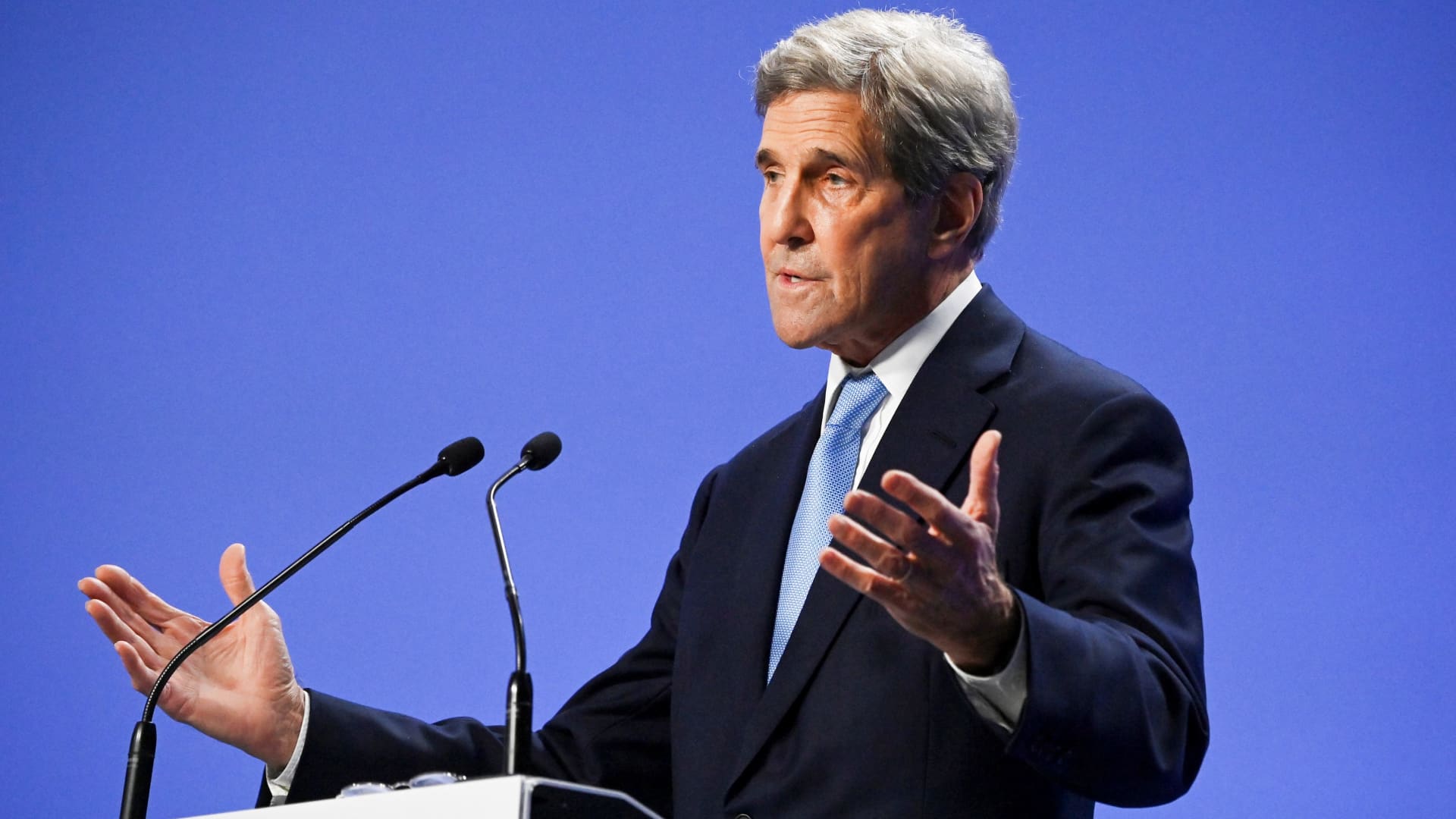
A delegate walks past a sign during the UN Climate Change Conference (COP26) in Glasgow, Scotland, Britain, November 11, 2021.
- The U.N. climate summit ended with calls on governments to return next year with tougher pledges to slash greenhouse gas emissions.
- Nations made new pledges on methane gas pollution, deforestation, coal financing, as well as a completion of long-awaited rules on carbon trading and a notable U.S.-China deal.
- Climate scientists, legal experts and politicians argue the final deal out of Glasgow resulted in incremental progress inadequate to address the climate crisis.

The United Nations global climate summit in Glasgow, Scotland, ended over the weekend with an agreement among nearly 200 nations to accelerate the fight against the climate crisis and to commit to tougher climate pledges.
The two week conference ended with some significant accomplishments, including new pledges on methane gas pollution, deforestation, coal financing, as well as completion of long-awaited rules on carbon trading and a notable U.S.-China deal. The summit also closed with calls on governments to return in 2022 with stronger pledges to slash greenhouse gas emissions and to provide more available funding for nations most vulnerable to a changing climate.
Get top local stories in Connecticut delivered to you every morning. Sign up for NBC Connecticut's News Headlines newsletter.
But some climate scientists, legal experts, and politicians argued the final deal out of Glasgow resulted in incremental progress inadequate to address the severity of the climate crisis. Some climate activists and campaigners also sharply criticized the COP26 as an exclusionary fortnight of talks that became a public relations exercise.

Some experts point out that the real measure of success after the COP26 will be if and when countries turn their promises into action.
Money Report
"In a year marked by uncertainty and mistrust, COP26 affirmed the importance of collective global action to address the climate crisis," Ani Dasgupta, president and CEO of the World Resources Institute, said in a statement.
"While we are not yet on track, the progress made over the last year and at the COP26 summit offered bright spots," Dasgupta said. "The real test now is whether countries accelerate their efforts and turn commitments into action."
Here's a look at some of the highlights from the 26th UN climate summit:
New pledges on methane pollution
More than 100 countries have now joined a U.S. and E.U.-led coalition to cut 30% of methane gas emissions by 2030 from 2020 levels, a significant step towards limiting one of the major culprits of climate change.
The Global Methane Pledge covers countries that account for nearly half of global methane emissions and 70% of global GDP. Methane is 84 times more potent than carbon and doesn't last as long in the atmosphere before it breaks down. This makes it a critical target for combatting climate change quickly while simultaneously minimizing other greenhouse gas emissions.
Barry Rabe, a professor at the University of Michigan and a senior fellow at the Brookings Institution, said that while the summit devoted unprecedented attention to reducing methane emissions, the pledge is just a start.
"The Glasgow meetings serve as a reminder of just how hard it is to achieve transformational progress on climate change in a few weeks, despite all of the melodrama," Rabe said. "That said, [there's] some real progress here on issues such as carbon markets, coal transition, methane and more. The emerging question is whether these areas of agreement can be implemented."

The pledge includes six of the world's 10 biggest methane emitters — the U.S., Brazil, Indonesia, Nigeria, Pakistan, and Mexico. But China, Russia, and India, which together comprise 35% of global methane emissions, did not join the coalition.
"It's going to make a huge difference, not just when it comes to fighting climate change — it's going to improve health, improve food supply and boost economies," President Joe Biden said at the launch of the pledge.
An eleventh hour agreement on coal
The summit negotiations ended on Saturday with a final deal among nearly 200 nations that for the first time targeted fossil fuels as the key driver of climate change. The deal, however, contained a last-minute change that some officials called a softening of critical language regarding coal power.
India and China, some of the the world's biggest burners of coal, insisted on a last-minute change of fossil fuel language in the pact, switching the words from a "phase out" to a "phase down" of coal. Opposing countries fought the request but ultimately conceded.

Some experts, disappointed by the change of language on coal power, said the deal was still better than nothing and provides incremental progress on transitioning from fossil fuels to clean energy.
"It's meek, it's weak and the 1.5C goal is only just alive, but a signal has been sent that the era of coal is ending. And that matters," Greenpeace International Executive Director Jennifer Morgan wrote in a tweet about the deal.
A U.S.-China pledge to slow climate change
The U.S. and China, the world's two largest emitters of carbon, agreed to cooperate this decade to prevent global warming from surpassing 1.5 degrees Celsius and ensure that progress result from the conference. The alliance between the rivals surprised delegates during the summit.
The U.S.-China agreement lacks specific details or deadlines but emphasizes that Chinese and American leaders will work to boost clean energy, mitigate deforestation and slash methane emissions. The joint declaration said the countries will work together to help accelerate the transition to a net-zero global economy.

"The United States and China have no shortage of differences," U.S. special climate envoy John F. Kerry said in announcing the agreement during the summit. "But on climate, cooperation is the only way to get this job done."
Strengthening 2030 targets to reach 1.5°C goal
Some expert have billed the conference as humanity's last and best chance to support the goal to not surpass 1.5 degrees Celsius of global warming — the temperature target inscribed in the 2015 Paris Accord.
Countries ultimately agreed to submit tougher 2030 targets next year and to put forward long term strategies to aid the transition to net-zero emissions by around mid-century in order to avoid the worst consequences of climate change.
A draft of the final COP26 deal did not offer a rolling annual review of climate pledges that some developing countries have urged. Nations are currently required to revisit their pledges every five years. The agreement also left unresolved answers on how much and how swiftly each nation must cut its emissions.
Keeping global temperatures from surpassing the 1.5 degrees Celsius level will require the world to nearly half greenhouse gas emissions within the next decade reach net-zero emissions by 2050, according to the Intergovernmental Panel on Climate Change.
Scientists warn the world has already warmed about 1.1 degrees Celsius above pre-industrial levels. Despite global pledges, the world is on track to see global temperature rise of 2.4 degrees Celsius by the end of the century.
James Salzman, a professor of environmental law at UCLA Law School, said the summit reflected an important shift in global climate strategy toward a sectoral approach because it featured separate agreements on issues like methane, coal and deforestation, rather than focusing solely on greenhouse gas mitigation.
"Talk is cheap, of course, and it remains to be seen whether these amount to anything more than aspirational rhetoric," Salzman said. "But the pivot could be significant in breaking down a huge problem into more bite-sized approaches."
— CNBC's Sam Meredith contributed reporting






